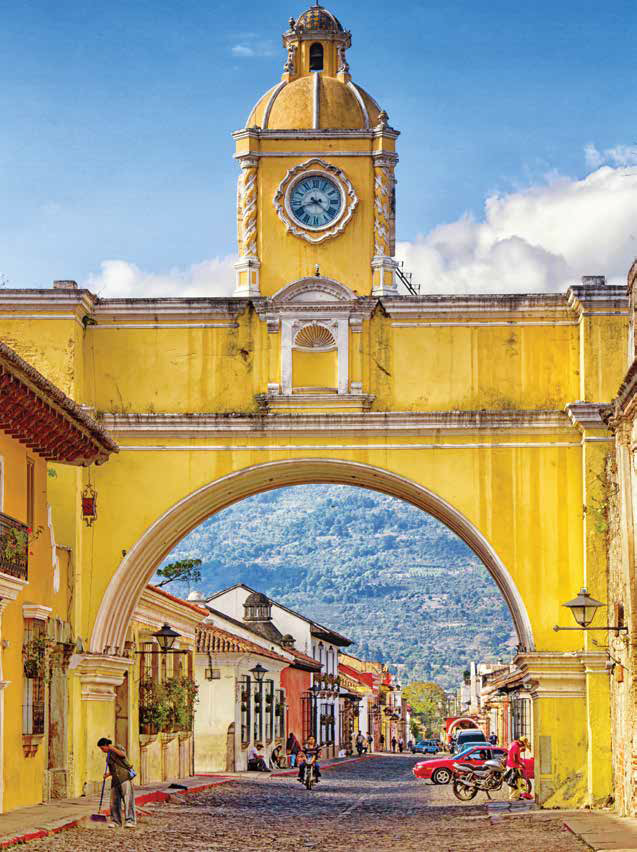
Teeming with natural resources, sunshine, fertile lands and an educated workforce, Guatemala mirrors its Central American neighbors in both resources and the dichotomy of its socio-economical structure. Rampant crime and corruption, coupled with a byzantine legal landscape sometimes outweigh the advantages of this Central American nation of 15.7 million, the most populated in the region.
“Guatemala has not been able to make sufficient progress to materially enhance its growth prospects, widen its revenue base and improve its fiscal flexibility,” wrote New York-based credit rating agency Fitch when it downgraded the country to BB from BB+ last June. “As a result, Guatemala’s relative standing in the ‘BB’ category has been eroded over the years.”
When given the task of opening shop in Guatemala, the main hurdle corporate counsel face is the long, red-tape filled process of registering corporations, properties, tax offices and business authorities. Requesting and obtaining the appropriate permits can take months.
Once the company is established, registering its property with the local authority can be an arduous process, due to the lack of adequate legal nomenclature for buildings, terrains and other goods, which causes multiple clerical errors at the time of registering. The World Bank, in its annual “Doing Business” report, classifies Guatemala as a country with inefficient structures that can lead to long and tedious administrative processes and even corruption.
This situation, however, stems out of the judicial uncertainty that plagues Central America. Judicial processes like lawsuits and execution of contracts take months, or in some cases years. The justice system is the backbone of a stable country, in this case the uncertainty of the system makes Guatemala a risky country to do business in. The legal requisites, easy and mundane in other parts of the world, rise to a new level of complexity in Guatemala and in Central America in general, with the widespread practice of corruption. It is hard to get anything done without shelling out some money for something that, in theory, should be free.
Guatemalan corporate lawyers often face these hurdles on their own. Legal departments usually contain only one lawyer, who must oversee all processes. Some companies have assistant lawyers and paralegals, but most of the activity is often centralized in one in-house lawyer. For a corporate lawyer this is not so much a hurdle; it is actually an opportunity to diversify expertise by simultaneously dealing with several different types of law: labor, trade, taxes, etc.
Lack of personal security is an endemic problem. The country often leads statistics regarding assassinations, kidnappings and other crimes. An overcrowded prison system doesn’t particularly help in defusing the security situation. The United Nations has stated that security problems and violence make Guatemala lose approximately US$500 million in investment. Home to Tikal, one of the world’s best-kept Mayan ruins and a stunning, untouched Caribbean coast, Guatemala can’t develop its tourism sector thanks to the rampant insecurity.
That’s why many lawyers, entrepreneurs, members of the civil society and students in Guatemala are taking action and are organizing to support changes in the local legal framework and to increase transparency and accountability of all branches of government.
The country needs it imperiously if it intends to become a developed nation.
“Guatemala’s credit profile,” Fitch added in its June assessment of the country’s economy, “is constrained by weak governance and human development indicators. A fragmented party system, divided legislature and prolonged periods of congressional gridlock (although eased somewhat recently) have slowed policymaking and the reform agenda of the current administration.”
Organizations like the local nongovernmental organization, “Congreso Transparente” (Transparent Congress) – an initiative born out of a group of law students from Francisco Marroquín University in Guatemala City – are actively working with the local national government to ease Guatemala’s legal landscape and promote a more efficient and transparent legal system to promote democracy.
The organization works with law and political science students from different Guatemalan universities on several legal initiatives, such as highlighting violations of the Guatemalan Constitution in the appointment of government officials and discussing the legal agenda Congress is seeking to approve. The goal, overall, is to push transparency in all branches of government, because opening up Guatemala’s government is the first step to reaching sustainability.
Congreso Transparente also seeks to incorporate Guatemala’s diverse population into the transparency debate, carrying out community workshops in remote places to explain to Guatemalans how Congress and the legal framework operate, and how it affects them. These workshops, which are free and open to the public, seek to educate people about the importance of participation, and how easy it is to exert their rights as citizens thanks to open government principles.
It is worth it
Guatemala has proven potential to become one of Latin America’s leading economies.
Despite its setbacks, the country managed to rank seventh in Latin America on the 2015 World Bank’s “Doing Business” index, which measures if the regulatory environment is more conducive to the starting and operation of a local firm. The Central American nation ranked well above economic powerhouses Costa Rica (10th), Brazil (24th) and Argentina (27th). Colombia, Peru, Mexico, Puerto Rico, Panama and Jamaica, respectively, lead the pack, while Venezuela and Haiti landed at the bottom.
Guatemala received high scores in ease to get credit, getting electricity and paying taxes, but received low scores in dealing with construction permits, trading across borders and enforcing contracts.
The nation’s geographical location, right in the middle of Central America with a long border with Mexico and access to the Pacific and Atlantic Oceans, makes the country a strong candidate for leadership in transoceanic commerce. The hard operating conditions have created a resilient workforce, with a strong sense of perseverance and a think-outside-the-box attitude when it comes to problem solving.
Young entrepreneurs have created oasis where they can thrive. In the form of cooperative workspaces and other incubator-like enterprises. One of them is Chamba, a local entrepreneurial co-working space, which provides creative spaces to exchange ideas and makes the entrepreneurial community stronger.
Other industries are already booming.
The Contact Center and Business Processing Outsource sector is booming, creating close to 230,000 jobs and US$240 million in revenue. This sector is credited as one of the primary reasons why Guatemala’s unemployment rate maintains steady at 3 percent, one of the lowest in the Americas. The tech sector is booming, and both private and public sectors are working on providing the best infrastructure for this sector to continue its rapid growth.
Investing in Guatemala is a risky endeavor. But thanks to the initiatives in the private, public and non-governmental sectors, this Central American nation could, in the next 20 years, become a global economic and industrial leader.





